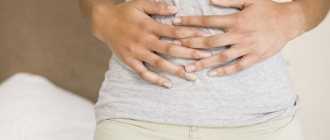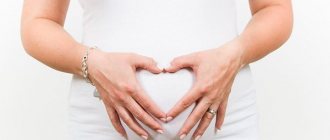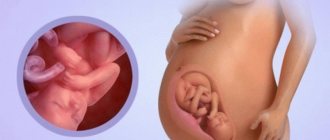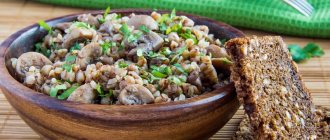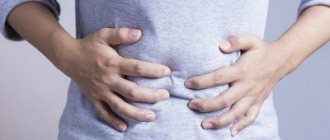The second trimester of pregnancy begins at week 13 and lasts until the end of week 27. The second trimester is considered the calmest period of pregnancy. This is due to the fact that toxicosis subsides, the woman becomes energetic again, apathy and drowsiness go away, and the pregnant woman is in a good mood most of the time.
MOM'S WELL-BEING, HEALTH FEATURES AND POSSIBLE ILLNESSES
Stretch marks on the stomach and chest.
The belly in the second trimester of pregnancy increases noticeably, along with this there is a high probability of stretch marks appearing. In addition, stretch marks appear on the chest, also due to an increase in size.
Stretch marks are atrophic changes in the skin, they are caused by the destruction and hyperplasia of connective tissue. These changes are associated with impaired collagen synthesis. In addition, the formation of stretch marks is influenced by hormonal changes and mechanical stress. Stretch marks can occur with sudden weight gain, so you need to monitor your diet and activity level.
The width of stretch marks varies, as a rule, 1-5 mm, and the length - 0.8-10 cm, color: whitish, with a yellow, blue or even bluish tint, the skin at the site of stretch marks becomes thin.
To prevent the formation of stretch marks, you need to monitor your diet, take the necessary vitamins, strengthen your muscles, do a gentle massage, use oils or a rich cream, and wear a bandage.
Discharge.
Normally, the discharge should not have any tint, the color should be transparent or slightly whitish. There should be no smell, a slight sour smell is allowed. If the discharge has a strong odor, a cheesy consistency, or a greenish or yellow tint, you should immediately consult a doctor.
Anemia.
Anemia is a decrease in hemoglobin in the blood. Pregnancy leads to an increase in the amount of circulating blood, as a result of which hemoglobin drops below normal. The next reason is poor nutrition. If the indicator is below the limit of 110 g/l, it is necessary to solve the problem, since this condition can lead to miscarriage, low blood pressure, placental abruption, delayed fetal development or premature birth.
When hemoglobin decreases, a pregnant woman feels weakness, fatigue, drowsiness, headaches, shortness of breath, tinnitus, and possible fainting.
To normalize hemoglobin concentration, you need a varied diet and iron supplements, which are prescribed by your doctor.
Runny nose.
A runny nose during pregnancy in the second trimester is a common occurrence. There is such a thing as “rhinitis during pregnancy.” Physiological runny nose is quite difficult to eliminate, but it is not dangerous and goes away on its own; symptomatic treatment that will alleviate the condition is prescribed by the doctor.
But there are cases when a runny nose is a symptom of a cold in the 2nd trimester, in which case safe treatment is necessary.
In any case, you must inform your doctor about the presence of a runny nose.
Edema.
Edema appears due to the fact that the amount of fluid in the body increases and a large amount of progesterone is produced, which causes edema. Minor swelling (physiological) is not critical and occurs in almost all pregnant women. Increased swelling (pathological) may indicate kidney disease.
To reduce swelling, it is necessary to follow a work and rest schedule, walk daily, wear comfortable shoes, maintain a drinking balance, eat a balanced diet, and do not overuse salt. In case of pathological edema, it is necessary to eliminate the etiological factor; for this, the doctor will prescribe you an examination and treatment.
Dyspnea.
Causes of shortness of breath in the 2nd trimester of pregnancy:
- weight gain;
- enlargement of the uterus, which puts pressure on neighboring organs;
- reduction in lung volume;
- anemia;
- swelling;
- chronic diseases of the respiratory and cardiovascular systems.
To alleviate the symptoms, you need to monitor your posture, perform breathing exercises, and remember to rest and walk.
Headache.
Headache during pregnancy in the 2nd trimester is quite common. This is due to changes in hormonal levels, as well as body tension and stress. For many women, headaches are triggered by weather changes, strong odors and fatigue. To prevent and eliminate headaches, you need to rest and limit exposure to stress factors. In case of severe pain, you should consult a doctor who will give the necessary recommendations.
Lower back pain.
During pregnancy, the center of gravity shifts; as the stomach grows, it puts more stress on the spine, especially the lumbar region. In addition, kidney disease can be the cause of such pain.
If, after the examination, the doctor has issued a conclusion that you are absolutely healthy, but pain still accompanies you, you must follow the following recommendations:
- wearing a bandage;
- gymnastics for pregnant women (to relieve the musculoskeletal system);
- comfortable shoes (no heels).
Urination.
As in the first trimester, you tend to urinate much more frequently than before pregnancy. This is due to increased pressure from the enlarged uterus on the bladder. If going to the toilet is not accompanied by painful sensations, and there are no impurities in the urine, there is no reason to worry.
Dry eye syndrome.
Increased production of estrogen provokes instability of intraocular pressure, which leads to dry cornea. First of all, you should limit your intake of foods high in salt.
If there is increased dryness, you should contact an ophthalmologist, who will check the condition of your eyes and prescribe remedies to eliminate the problem, if necessary.
Breast care (underwear and nipples).
As the second trimester approaches, nipple sensitivity decreases, but despite this, it is necessary to care for the areolas and nipples to prevent cracking and drying out. To do this, you need to use moisturizers or rich creams. A pregnant woman may leak colostrum; in these cases, it is worth using breast pads and maintaining constant cleanliness to prevent infection.
Choose a bra with wide straps, it must be the right size, this helps support the breasts. Underwear should be made from natural fabrics, without wires or foam rubber, this is necessary so that the chest can “breathe.”
Turns my stomach
When a woman notices that her stomach is twisting during early pregnancy, regardless of food intake, she should seek advice from a gastroendocrinologist. Probable causes can be either dangerous or opportunistic. All that the doctor will suggest to do is to undergo an additional course of research in order to determine the true pathogenic symptoms.
Important.
Pregnancy often serves as a provoking factor for exacerbation of existing diseases. In particular, there is a risk of exacerbation of diseases of the pancreas and stomach, esophagus and duodenum. This is due to changes in the hormonal balance of the body and a shift in the location of internal organs.
It is worthwhile to divide the signs and symptoms into the following parameters:
- Time of onset of the uncomfortable process - in the morning or evening, after eating, during or after it?
- Intensity of pain – does it hurt more before eating or after several hours?
- Duration of pain – from several minutes to an hour or more than several hours, regardless of food intake and physical activity?
Dangerous diseases of the digestive system that require an immediate response are always accompanied by spasms, an increase in body temperature to a thermal value (more than 39 degrees and above), and the intensity of symptoms. Often a woman notes that the pain begins to increase, regardless of the medications taken. A pregnant woman can talk about increasing symptoms, up to an hourly measurement of pain intensity.
In such cases, we can talk about vivid symptomatic manifestations of previously diagnosed chronic diseases, or the presence of new diseases provoked by one or another factor. As a rule, all negative processes that grow during gestation are caused by special changes in the body, namely hormonal fluctuations.
If it twists in early pregnancy
If during the early stages of gestation the stomach constantly twists, the woman feels weak, and the stomach aches regardless of food intake, in this case several reasons can be considered. Often the problem lies in diseases such as:
- biliary dyskinesia;
- acute or chronic cholecystitis;
- gastroenteritis;
- enterocolitis;
- thrush of the esophagus.
In particular, when hormones change, the body’s immune forces weaken, which provokes the colonization of the digestive organs by bacteria and infections. Enterocolitis is distinguished into infectious and non-infectious nature. The latter type is more common.
Symptoms of gastroenteritis vary depending on the cause of the provocateur. If infectious gastroenteritis is accompanied by vomiting, bloody diarrhea, colic and fever, then parasitic gastroenteritis is a chronic disease. In these cases, it is important to pay attention not only to what is swirling in the stomach, but also to the nature of the stool.
If there is mucus, weakness, or temperature, these are manifestations of an intestinal infection that occurs due to eating low-quality food in unsanitary conditions. Often such diseases are provoked by foods such as milk, fish, meat and offal. The disease is often accompanied by muscle pain and drowsiness. In this case, it is important to constantly drink plenty of fluids and consult a doctor.
Important.
Dehydration during pregnancy is a mortal danger for the development of the fetus and the functioning of the placenta. In dangerous cases, such poisoning can cause miscarriage or fetal development pathologies.
Parasitic gastroenteritis is manifested by frequent chronic diarrhea without blood per day. If such manifestations are not caused by amoebic dysentery, weakness and weight loss are noted.
Non-infectious gastroenteritis is aggravated by disorders of the esophagus, weakness is observed, there is cramping in the stomach and there is no desire to eat. At the same time, I want to drink water all the time. Manifestations include both minor and pronounced symptoms. In this case, such manifestations as severe diarrhea, colic, fatigue or weight loss are accompanied by a periodic deterioration in the general condition.
If in the normal state such manifestations do not pose a danger, then people with reduced protective functions of the body run the risk of developing dangerous complications. Since during the development of a child (during pregnancy) all the forces of the body are directed towards its growth and intrauterine development, the protective forces of the immune system weaken. As a result of the gag reflex, which in the initial stages is also caused by toxicosis, dehydration can develop, which can lead to complications, including death.
Reference.
With moderate dehydration, dry mouth, urination, and drowsiness are observed. This condition can be corrected without hospitalization. Signs of severe dehydration - cold extremities, excessive urination, shallow breathing .
Late pregnancy and before childbirth
In the later stages, if your stomach is twisting, you should pay attention to the following features:
- pain intensity;
- duration;
- associated symptoms – fever, headache, nausea, colic;
- place of pain.
If you have pain in your side (it doesn’t matter whether it’s on the right or the left), and at the same time you feel nauseous, have cramps, and have gases, you should pay attention to your diet, which can cause indigestion, enlargement of the pancreas, and liver.
In most cases, abdominal pain before childbirth is due to the fact that the internal organs, in particular the stomach, pancreas and liver, have shifted several centimeters and now occupy a different space than they did before. There is no point in talking about the danger of such a condition, because the female body is designed this way physiologically. But with poor nutrition and the choice of low-quality, heavy food products, such an oversight can be accompanied by pain and digestive disorders.
When your stomach turns during pregnancy, you can follow simple recommendations such as eating frequent but small portions, and also follow the recommendations of nutritionists:
- Before giving birth, exclude from the diet all foods that cause fermentation. These include white and blue cabbage, beans, legumes, lentils, sweet and flour.
- Eat in small portions so that there is a slight feeling of malnutrition.
- Eliminate fatty animal foods from your diet, which can only be consumed before 2 pm. During this time, it is worth paying attention to light foods that are absorbed by the body and are not stored in reserve. These include dairy products, in particular cottage cheese, low-fat sour cream, whole grain cereals, steamed vegetables and lean meat.
- Do not wash down food while chewing it with water or juices. It is advisable to consume 1 glass of juice as an afternoon snack, and not as a liquid to improve digestion. The acidic environment of natural juices can cause complications in digestion, which is dangerous for pregnant women.
Important.
If you want to drink juices, it is better to make them at home, using natural fruits and vegetables - carrots, apples, blackberries, raspberries and strawberries, cherries and pears. Store-bought juices are nectars that contain sugars and flavor enhancers, diluted with water.
- If we are more than 35 weeks pregnant, we must exclude from the diet fresh baked goods and any food products using first-grade flour; it is better to replace them with dry bread, bagels or biscuits.
- Avoid eating pasta and white rice throughout pregnancy. Pasta should be replaced with products made from hard whole grain wheat, and the usual white rice can be replaced with brown rice, which is higher in calories, but its absorption will require more energy from the body, which forces you to spend more calories on processing such products.
When they say that in later stages the stomach often turns, this indicates in most cases that the woman does not adhere to nutritional rules, chooses the foods that she wants, and not those that are healthy. Of course, eating chocolate or drinking cappuccino won’t hurt, but only if this happens in the first half of the day.
Medicines
Often fermentation and colic in the abdomen are caused by taking pills or medications. Since the list of medications acceptable for use during pregnancy is limited, it will not be difficult to calculate and conduct a small experiment. For example, often if there is pain or fever, a pregnant woman is recommended to use those medications that are approved for use by infants. Most often on this list are drugs containing ibuprofen.
In turn, such an active component causes pain in the abdomen, not often, but it provokes colic. To determine whether this can really be caused by taking Nurofen, Ibuprofen or other tablets or suspensions with the same component - ibuprofen, you should stop using the medicine for a day. If such sensations stop when you stop taking pills, most likely the cause of pain or torsion in the abdomen is precisely these drugs.
Important.
The effect of ibuprofen is most intense in the first 5 days of use. After this period, the drug may become inert to the source of pain. For example, if you take Nurofen for more than 5 days for a toothache or headache, then after this period the head will hurt, regardless of taking the pills. This is due to the fact that the drug no longer acts as an analgesic.
STAGES OF CHILD DEVELOPMENT IN THE SECOND TRIMESTER OF PREGNANCY
Week 13. Size – 6-7 cm. The rudiments of twenty teeth (deciduous) appear, all organs are formed and continue their growth and development.
Week 14 Size 8-9 cm. The spine is strengthened, a reaction to light occurs, the salivary and sex glands activate their work, and intestinal peristalsis appears.
Week 15 Size – 10-11 cm. Papillary lines (imprints) are formed, the baby makes active movements.
Week 16 The bones of the skeleton harden, and egg precursors begin to form in the female fetus.
Week 17 Size 12-13 cm. A small layer of fat forms under the skin, the genitals are already formed; sometimes, by ultrasound, it is already possible to determine the sex of the baby.
Week 18. Hematopoiesis develops, proteins appear that form the blood group.
Week 19. The rudiments of molars begin to appear, they are located under the milk teeth, the baby is already able to swallow amniotic fluid, which, after being absorbed in the stomach, is processed by the kidneys and returns to the uterine cavity.
Week 20 This week is conventionally the equator of pregnancy. The centers that control the functioning of organs and systems are finishing forming in the brain.
21 weeks. Size - about 22 cm, weight around 400 grams, the brain continues to develop.
Week 22. At this stage, the fetus develops its own daily routine.
Week 23. Hearing becomes sharper.
Week 24. Now the lungs enter the stage of active development.
Week 25. The skin loses its transparency.
Week 26. Size - about 23 cm. A surfactant is formed in the lungs, which is a protective substance; the eyeballs are already formed.
Week 27. The eyelids are open, the retina is formed.
VISIT DOCTOR
How often to visit doctors.
It is recommended to visit your leading obstetrician-gynecologist once every two weeks. Frequent visits are needed to constantly monitor the dynamics of fetal development and the condition of the expectant mother. Other specialists should be visited as needed or as directed by your doctor.
Ultrasound screening at 18-24 weeks is especially important, as it helps to identify genetic diseases.
What tests to take.
The Ministry of Health recommends taking tests for the following studies: antibodies G, M, OAC, carbohydrate metabolism, OAM.
NUTRITION FOR A PREGNANT WOMAN
What is possible.
What is possible in the 2nd trimester of pregnancy, what foods should always be in the diet?
During this period, the fetus’s brain is actively developing; magnesium, iodine and phosphorus are necessary for normal development. Vitamin D is needed for the formation of the skeleton. Therefore, it is worth including foods containing these elements in your diet.
The optimal frequency of meals is 5-6 times a day, in small portions. Food should be baked or steamed; it is better to avoid fried and fatty foods, as this increases the load on the liver.
Include a large amount of vegetables and fruits in your diet; they contain many vitamins and minerals that your baby needs for growth and development.
It is recommended to increase the calorie content of your usual diet by at least 300 calories, but everything is calculated individually by the specialist with whom the woman is registered.
What is not allowed.
You should refuse:
- alcohol;
- products with high salt content;
- coffee (only with a doctor’s permission);
- fried and fatty;
- increased amount of fast carbohydrates,
- canned food;
- spicy food;
- carbonated drinks.
How much fluid to drink.
The optimal amount of liquid consumed is 2-2.5 liters. This amount is allocated not only for “free” water, but also for tea, compotes, and broths.
Vitamins for pregnant women.
Vitamin complexes include the following components:
- folic acid or vitamin B9;
- iron;
- iodine;
- omega-3;
- vitamin C;
- vitamin D;
- magnesium.
Kabrita purees are a good option for a balanced snack. The puree is intended for baby food, so it has an excellent composition:
- organic fruits and berries;
- goat milk cream.
The puree does not contain sugar, starch, preservatives or GMOs. The expectant mother will receive from such nutrition not only vitamins, but also the pleasure of taste.
How to keep your weight under control.
In order not to gain too many extra pounds, you need to follow simple rules: a balanced diet, caloric intake, daily walks, eight hours of sleep, the last meal - 2-3 hours before bedtime.
Diarrhea during pregnancy
Why is diarrhea dangerous during pregnancy?
The consequences of severe diarrhea while pregnant can be serious. If you have the first signs of illness, undergo self-diagnosis on one Diarrhea during pregnancy is dangerous because the expectant mother:
- spontaneous abortion may occur;
- blood pressure will decrease sharply;
- Kidney failure may begin.
In addition, the fetus may develop congenital abnormalities that are not always treatable. They usually occur in the first months, but even after the 30th week of pregnancy such ailment remains extremely dangerous. Severe diarrhea during this period becomes:
- the cause of dehydration, and quite severe;
- risk factor for thrombosis;
- stimulator of premature birth.
At the same time, from 38 to 40 weeks, diarrhea also develops quite often. This is not dangerous, as the body simply begins to prepare for childbirth. In this way, it cleanses itself of toxins and other substances.
How to treat diarrhea during pregnancy
If the cause of the illness is another disease, the doctor will prescribe remedies for it. He will tell you how to treat diarrhea during pregnancy in such a way as not to harm the fetus. After all, the main difficulty is that medications, if chosen incorrectly, can cause developmental defects in the fetus.
If we talk about generally accepted norms, the doctor usually prescribes:
- for bacterial infection - antibacterial agents;
- for a viral infection, drink plenty of fluids and take antiviral medications;
- for pancreatitis - enzyme agents, as well as antispasmodics;
- for bacterial overgrowth syndrome - antibacterial drugs;
- for cholecystitis - antispasmodics and choleretic drugs.
It is imperative to follow a diet and drink as much fluid as possible. In addition, you can follow these preventive measures:
- regularly visit an obstetrician-gynecologist;
- refuse trips to exotic countries;
- wash your hands before eating;
- include as many vegetables and fruits in your diet as possible;
- take vitamin complexes for pregnant women;
- Monitor the shelf life of food products.
You should also consume more often if you have an upset stomach:
- weak black tea;
- Apple juice;
- various types of jelly, especially useful from blueberries;
- low-fat chicken broth;
- bird cherry compote;
- Herb tea.
To reduce drinking as much as possible, or better yet, stop drinking altogether, you need to:
- coffee;
- sparkling sweet water; v
- tap water;
- any alcoholic beverages even with a low alcohol content.
SEX DURING PREGNANCY
In the second trimester of pregnancy, sexual activity becomes much more active than in the first, and libido increases. This is due to the fact that malaise and discomfort fade into the background, and the woman again begins to live a full life.
Contraindications for sexual intercourse include:
- risk of premature birth;
- threat of interruption;
- pain;
- placenta previa;
- infectious diseases of the genital tract and the stage of their treatment.
Your doctor will answer the question of whether sex is allowed for you.
COMPLICATIONS DURING PREGNANCY
The most common ailments.
- iron deficiency anemia, resulting in weakness;
- rhinitis of pregnant women;
- headaches (migraines);
- nagging pain in the lower abdomen and lumbar region;
- visual impairment;
- swelling;
- dyspnea.
In what cases should you immediately consult a doctor?
- pathological discharge;
- uterine bleeding;
- excessive swelling;
- painful urination;
- sharp pain in the lower abdomen;
- lack of fetal movement;
- leakage of amniotic fluid.
What medications can you take?
- When the temperature rises, paracetamol-based medications are allowed.
- Saline solutions for rinsing the nose.
- Gargling solutions based on natural ingredients.
- If a cough occurs in the 2nd trimester of pregnancy, lozenges are recommended (they have only a local effect).
- Antihistamines (to relieve swelling, strictly under medical supervision).
Medicines can only be taken on the recommendation of a doctor!
What medications should you not take?
A large percentage of medications are contraindicated in the second trimester; self-medication can negatively affect the baby’s development!
You should not take:
- antidepressants;
- analgesics;
- antihypertensive drugs;
- hormonal drugs.
Why does your stomach hurt in early pregnancy?
In the initial weeks of pregnancy, the stomach feels twisted due to hormonal changes, toxicosis and wearing low-quality tight clothes around the waist. In particular, you should avoid skinny jeans and materials that are not natural and synthetic.
If in the later stages changes in the digestive system are caused by the growth of the child and the pressure of the uterus on the walls of the peritoneum and internal organs, then in the early stages such a change is not yet observed, and all changes occur for other reasons.
The most common cause is dysbiosis.
What is dysbiosis during early pregnancy, and why is it dangerous?
Dysbacteriosis cannot appear in completely healthy people. As a rule, this indicates trouble in the body, in particular in the immune or digestive systems. Since food digestion cannot be ensured without the participation of intestinal microbes, the required number and types of microbes are naturally present in its walls.
When dysbiosis appears, the percentage of “bad” and “good” microorganisms changes, which provokes disruption of the gastrointestinal tract. Beneficial microbes are bifidobacteria, lactobacilli and bacteroides; they help digest food, protect against allergies, and reduce the likelihood of developing cancer. Staphylococci, streptococci or Candida are “bad” microorganisms that, when the immune system is weakened, immediately take advantage of the situation and instantly multiply.
When such harmful microbes begin to take over, dysbiosis develops, which is not considered an independent disease, but is a manifestation of other diseases in the aggregate. That is, there is no point in treating dysbiosis itself with beneficial bacteria. It is necessary to find out the cause of this condition, and dysbiosis and colic will disappear after treatment.
Chronic disease or prolonged neglect of symptoms can accompany gastritis, pancreatitis, or be the result of an intestinal infection.
Reference.
Dysbacteriosis often develops after taking antibiotics. In this case, there is a need to take separate groups of lactobacilli and bifidobacteria, prescribed by a doctor.
The impetus for the development of such manifestations as colic and dysbiosis can be a change in diet, its quality, and hormonal changes. You can suspect the disease if you have the following symptoms:
- bloating;
- diarrhea;
- constipation;
- bad breath;
- nausea;
- food allergies.
In this case, you need to contact a gastroenterologist, who will refer the pregnant woman for a bacteriological analysis of stool. If dysbiosis as a diagnosis is confirmed, treatment with diet and probiotic supplements is prescribed. Therapy aimed at the cause of dysbiosis is mandatory.
Reasons for the development of dysbiosis during pregnancy
The following reasons lead to the development of a disease accompanied by colic and high gas formation in the abdomen:
- drinking antibiotics;
- intestinal infections - dysentery or salmonellosis;
- gastritis;
- history of peptic ulcer;
- pancreatitis or the most common cause of pregnancy is cholelithiasis;
- operations performed before conception on the stomach and intestines;
- eating large amounts of flour, sweet or spicy foods;
- There is no required amount of plant foods, milk and kefir in the daily diet.
A decrease in the body's protective functions during pregnancy is also the main reason for the appearance of colic and the fact that the stomach often twists both before and after meals.
PHYSICAL ACTIVITY DURING PREGNANCY
Severe pain during pregnancy in the second trimester is a reason to refuse physical activity and a reason to urgently consult a doctor.
But if a pregnant woman feels great, moderate physical activity in the form of walking, swimming, yoga or gymnastics will only be beneficial for pregnant women.
Women endure the second trimester of pregnancy much easier than the first. Monitor your condition, visit your doctor regularly, get more positive emotions, and pregnancy will bring you extremely joyful moments.
Share on social media networks
What to do when a pregnant woman has a stomach ache
What should you do if you have stomach cramps during pregnancy, what medications can you use or what can you do to make this unpleasant sensation go away? First of all, you should pay attention to such features as physical activity and nutrition. These are the main factors that can cause complications in the functioning of the digestive organs. Also, one should not exclude stress factors in which women feel not only weakness and a twisting sensation in the stomach, but also changes in stool in any direction.
Physical exercise
Physical exercise is not contraindicated even during pregnancy. The intensity, duration and nature of training differ, but not their presence. You cannot sit at home and not leave your apartment unless there is direct evidence from a doctor. Such indications may be due to placenta previa, bleeding or complex forms of uterine hypertonicity. In other cases, if the doctor does not talk about constant bed rest, you cannot refuse to go for walks.
Elementary exercises in the form of Nordic walking, long strides or fast walking will help normalize the functioning of the digestive system, and oxygen consumed in the blood in greater quantities during physical activity will help the child receive it in greater quantities. For advances, you can choose any time of the day, the duration is at least 30 minutes, but no more than an hour. Before going to bed, such exercises will help normalize the oxygen supply to brain activity, improving blood supply to the organ.
It is useful and effective to use breathing exercises during any stage of pregnancy. It will help normalize the functioning of the digestive system; moreover, it does not require special supervision from professionals, such as yoga. To use this technique, you should do the following:
- Sit on a flat, stable surface, preferably a soft carpeted floor.
- Straighten your back, leaning it against the wall.
- Place your feet hip-width apart while sitting on the floor.
- Place your hands palms up in a way that is comfortable.
- Take a deep (maximum possible) breath of air through your nose.
- Exhale through your mouth with jerky movements. Such an exit will be like sharp jolts.
- Make the last breath of exhaled air smooth and slow.
- Carry out such movements 5 times, rest with your eyes closed (you can listen to music on headphones) for 10 minutes. Then repeat the inhalation/exhalation movements 3-4 times.
Important.
You need to repeat these exercises on an empty stomach.
Nutrition
If changes in stool are noted, loose stools are observed during pregnancy, and the stomach is twisting, you should pay attention to the quality of the products and their calorie content. If food is provided in large portions, and the total calorie content is high, then the digestive system physiologically cannot cope with this feature, discomfort is noted in the lower abdomen, it twists and colic appears.
To reduce such manifestations, it is worth including flax seeds, seaweed fiber, tomatoes, pumpkin, buckwheat and millet in your diet. These products will help normalize the functioning of the gastrointestinal tract and strengthen intestinal motility. In particular, it is worth paying attention to such an infrequent product on our table as pumpkin. It has many useful minerals, fiber and vitamins, which are not only essential for a woman, but also beneficial for a child.
Reference.
More vitamins are retained in pumpkin if it is baked in the oven at a temperature of no more than 180 degrees.


